Adultery in Marriages in India, while decriminalised in 2018 (except in armed forces), remains a significant factor in civil legal proceedings. Kanoonpedia is providing a comprehensive guide for individuals seeking legal recourse if their spouse is in an adulterous relationship, based on current Indian law and judicial precedents since Adultery is no more a crime in India.
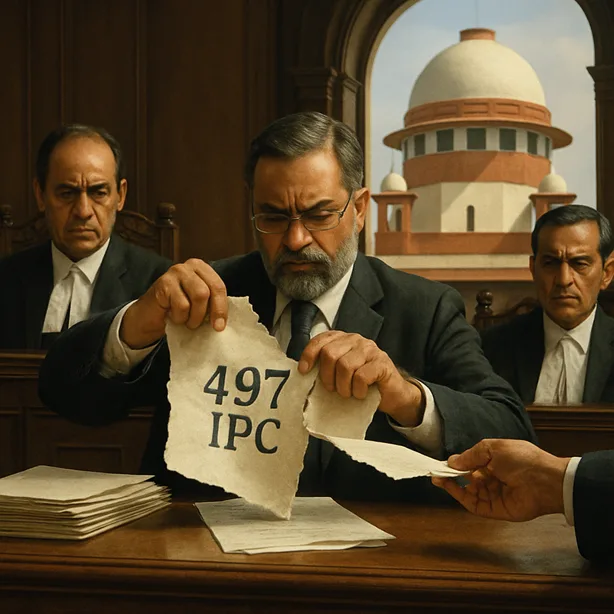
Table of Contents
Current Legal Status of Adultery
Adultery is no longer a criminal offence in India after the five-judge Constitution bench observed that, Section 497 is a denial of substantive equality as it perpetuates the subordinate status ascribed to women in marriage and society. Chief Justice of India (CJI) Dipak Misra said Adultery in Marriages can be a ground for divorce but not a criminal offence. Supreme Court struck down Section 497 of the Indian Penal Code (IPC) in Joseph Shine v. Union of India (2018).
The Court ruled that criminalizing Adultery in Marriages violated Articles 14 (equality), 15 (non-discrimination), and 21 (privacy) of the Constitution . However, it remains a valid ground for divorce and can impact civil matters like maintenance and custody. Must also be aware of What Your Family Can Do If Your Wife Kills You

Article 14 (Right to Equality)
Article 15 (Non-Discrimination)
Article 21 (Right to Privacy)
How Section 497 was discrminating
According to section 497 of Indian penal code
“Whoever has sexual intercourse with a person who is and whom he knows or has reason to believe to be the wife of another man, without the consent or connivance of that man, such sexual intercourse not amounting to the offence of rape, is guilty of the offence of adultery, and shall be punished with imprisonment of either description for a term which may extend to five years, or with fine, or with both. In such case the wife shall not be punishable as an abettor.”
In Joseph Shine v. Union of India (2018), the Supreme Court of India decriminalized adultery by striking down Section 497 of the Indian Penal Code (Indian Penal Code) and Section 198(2) of the Code of Criminal Procedure (CrPC) to the extent they applied to adultery. The Court held these provisions unconstitutional for violating Articles 14, 15, and 21 of the Constitution, which guarantee equality, non-discrimination, and the right to life and personal liberty, respectively.

Adultery no more a crime
Violation of Constitutional Provisions
- Article 14 (Equality Before Law):
Section 497 was deemed to be manifestly arbitrary as it imposed criminal liability only on men and not on women for Adultery in Marriages, such entire exemption of women sounded unjust to the Honorable Apex Court. The provision also treated women as the “sexual property” of their husbands, denying them agency and propelling gender stereotypes. By criminalizing a man’s sexual relations with a married woman without her husband’s consent, the law confined women to be seen as husbands property in marital relationships, thereby violating equality. - Article 15 (Prohibition of Discrimination):
The Court emphasized that the provision’s gender-specific framework reinforced patriarchal norms by assuming men alone could disrupt marital harmony. It failed to recognize women’s autonomy and dignity, discriminating against them by denying legal recognition of their capacity to consent or commit Adultery in Marriages. This violated the constitutional mandate against sex-based discrimination. - Article 21 (Right to Life and Personal Liberty):
Criminalizing adultery infringed upon the sexual autonomy and privacy of individuals within marital relationships. The Court underscored that trust and equality in marriage cannot be legislated through penal sanctions. By allowing the state to intrude into intimate marital choices, Section 497 violated the right to dignity and personal liberty.
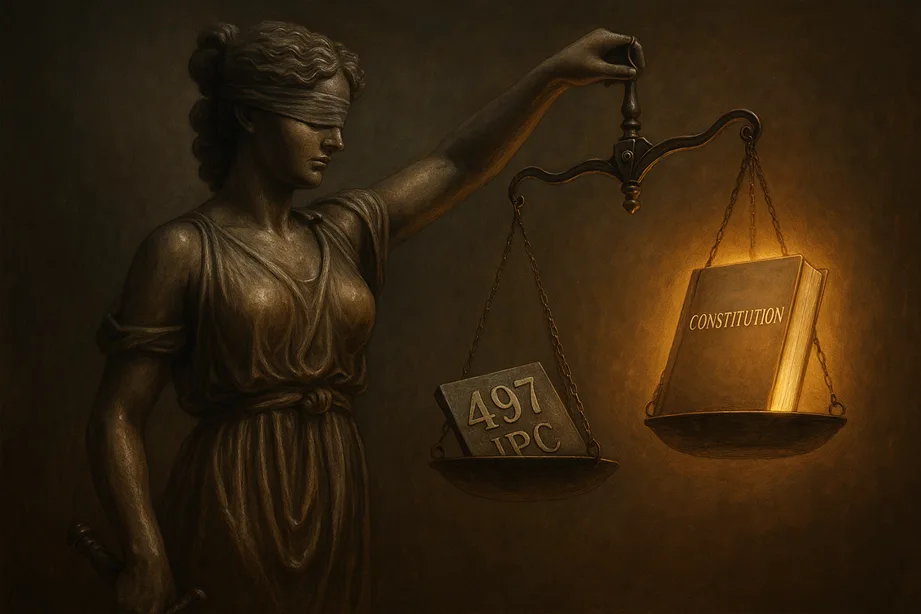
Impact on Legal Framework
- Section 497 IPC was struck down in its entirety for being incompatible with constitutional values of equality and individual freedom.
- Section 198(2) CrPC, which governed the procedural aspects of prosecuting adultery, was invalidated only insofar as it applied to Section 497, ensuring no residual criminal liability.
Judicial Rationale
The Court rejected the colonial-era rationale that Adultery in Marriages threatened the “sanctity of marriage,” asserting that such matters belong to the private realm of civil remedies, not criminal law. It highlighted that penalizing adultery perpetuated gender inequality and failed to align with modern constitutional principles of individual autonomy and equal partnership in marriage.
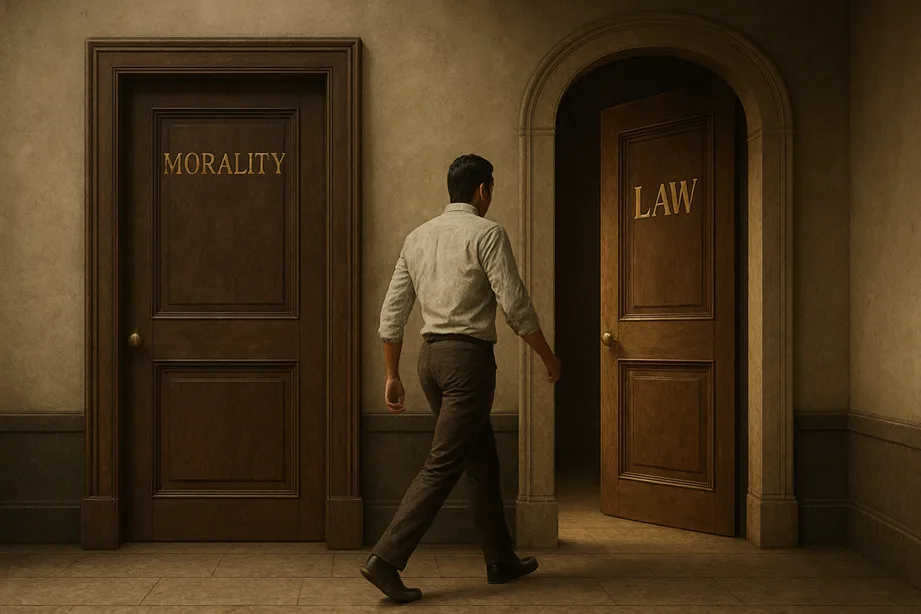
This landmark judgment redefined marital relationships as partnerships of equals, prioritizing dignity and agency over archaic moralistic impositions.
Civil Remedies Available
1. Divorce
- Hindu Marriage Act, 1955 (Section 13(1)(i)): Adultery can be taken as a concrete ground for divorce if the spouse engages into a voluntary sexual intercourse outside marriage. such cases are being increasing day by day , This is to be noted that one can not be punished for Adultery in Marriages but can be given divorce if commits adultery.
- Special Marriage Act, 1954 (Section 27(1)(a)): Special marriage act is attracted in case of interfaith or civil marriages, same provision apply in such marriages too.
- Evidence Standard: this is the responsibility of petitioner to be able to prove the adulterous relationship through preponderance of evidence (e.g., communications, witness testimonies,circumstantial evidence etc).

2. Maintenance and Alimony
- A spouse’s adultery can affect maintenance claims under Section 24 of the Hindu Marriage Act or Section 125 of the CrPC. Courts may reduce or deny alimony if Adultery in Marriages is proven.
- The impact of Section 497 on maintenance claims in India is nuanced and governed by different legal provisions. Here’s an elaboration on how Adultery in Marriages can affect maintenance under Section 24 of the Hindu Marriage Act and Section 125 of the Criminal Procedure Code (CrPC).
- Section 24 of the Hindu Marriage Act, 1955
- Purpose: This section provides for maintenance pendente lite, which is temporary financial support during the pendency of divorce or other marital proceedings. It ensures that a spouse without independent income can meet their living expenses and litigation costs.
- Impact of Adultery: While Adultery in Marriages itself is not explicitly mentioned as a factor in Section 24, the court’s discretion in granting interim maintenance can be influenced by the conduct of the parties. If a spouse is found to have ended cohabitation through their misconduct (including adultery), the court may refuse or reduce interim maintenance.
- Key Factors: The court considers factors like income, expenses, and the ability to earn when deciding on interim maintenance. Adultery in Marriages might indirectly affect these considerations if it reflects on the spouse’s conduct and responsibility in the marriage.
- Section 125 of the Criminal Procedure Code (CrPC)
- Purpose: This section aims to prevent destitution by providing maintenance to wives, children, and parents who are unable to support themselves.
- Impact of Adultery in Marriages: Section 125(4) explicitly states that a wife who is living in adultery is not entitled to receive maintenance from her husband. However, this provision requires proof of a continuous adulterous relationship, not just an isolated incident.
- Key Factors:
- Proof of Adultery: The burden lies on the husband to prove that the wife is living in adultery. Mere allegations or suspicions are insufficient.
- Judicial Discretion: Courts exercise discretion to ensure fairness and equity. Even if Adultery in Marriages is proven, the court may still grant maintenance if denying it would cause undue hardship.
- Practical Implications
- Evidence: In both scenarios, evidence plays a crucial role. For Section 125(4), substantial proof of Section 497 is necessary to disqualify a wife from maintenance.
- Legal Representation: It is advisable for both parties to seek legal counsel to navigate these complex legal issues effectively.
- Court Discretion: Ultimately, the court’s decision will depend on the specific circumstances of each case, balancing the need for fairness with legal principles.
- In summary, while Adultery in Marriages does not automatically disqualify a spouse from receiving maintenance under Section 24 of the Hindu Marriage Act, it can influence the court’s discretion. Under Section 125 of the CrPC, proven Section 497 can disqualify a wife from receiving maintenance, but only if it is part of a continuous pattern of behavior.
3. Custody Battles
- The Guardians and Wards Act, 1890, is a foundational law governing child custody in India, with the best interests of the child being the paramount consideration. While infidelity alone does not disqualify a parent from custody, courts may consider its impact on the child’s welfare when deciding custody matters. Here’s an elaboration on how this works:
- Key Principles Under the Guardians and Wards Act, 1890
- Best Interests of the Child: The court’s primary concern is ensuring the child’s welfare, including their physical, emotional, and financial well-being. Adultery in Marriages is considered only if it directly affects the child’s welfare.
- Parental Fitness: The court assesses each parent’s ability to provide a stable and nurturing environment. infidelity might be relevant if it demonstrates a parent’s inability to prioritize the child’s needs.
- Jurisdiction: The District Court has the authority to appoint guardians for minors, considering both personal care and property management.
- Impact of Section 497 on Custody Decisions
- Not a Sole Determining Factor: Courts have consistently ruled that Adultery in Marriages cannot be the sole reason to deny custody. It must be proven that the adulterous relationship negatively impacts the child’s welfare. For instance, the Delhi High Court has stated that an extramarital affair cannot be the sole determining factor unless it affects the child’s welfare.
- Evidence Required: Mere allegations of cheating are insufficient. There must be concrete evidence showing how the relationship affects the child’s well-being. The Bombay High Court has also emphasized that Section 497 is a ground for divorce, not for denying custody, unless it impacts the child’s welfare.
- Mutually Exclusive Considerations: Divorce and custody proceedings have different considerations. Being a “bad spouse” does not necessarily mean being a “bad parent”. This distinction is crucial in ensuring that custody decisions prioritize the child’s needs over personal issues between parents.
- Recent Judicial Precedents
- Delhi High Court: Ruled that an extramarital affair cannot be the sole reason to deny custody unless it harms the child’s welfare. The court noted that being a faithful spouse does not equate to being a good parent, and vice versa.
- Bombay High Court: Held that Section 497 is a ground for divorce but not for denying custody, emphasizing that being a good mother is distinct from being a good wife.
- Practical Implications
- Balancing Welfare and Conduct: Courts balance the child’s welfare against parental conduct, ensuring that custody decisions prioritize the child’s needs over personal issues between parents.
- Legal Representation: It is crucial for parents to seek legal advice to navigate these complex considerations effectively.
- In summary, while Adultery in Marriages itself does not disqualify a parent from custody under the Guardians and Wards Act, 1890, courts will consider its impact if it affects the child’s welfare. The focus remains on ensuring the child’s best interests are served.
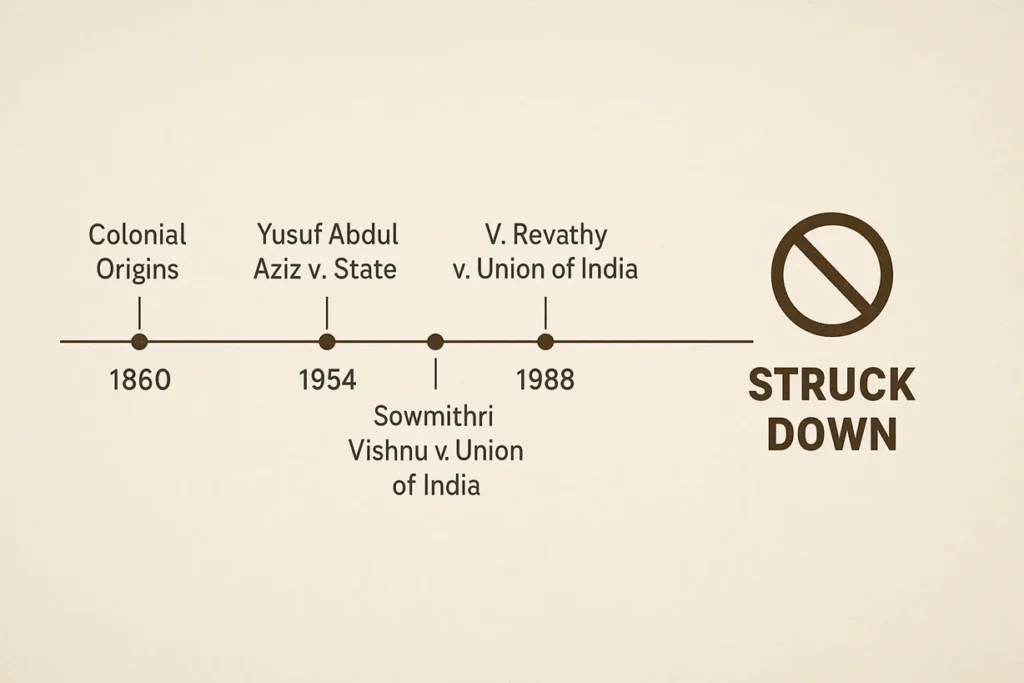
Key Case Laws
- Joseph Shine v. Union of India (2018):
- Struck down Section 497 IPC, ending criminal liability for adultery.
- Affirmed that Section 497 is a private moral issue, not a state concern.
- Yusuf Abdul Aziz v. State of Bombay (1954):
- Upheld Section 497’s constitutionality, treating women as “victims” rather than offenders. Overturned by Joseph Shine.
- Naveen Kohli v. Neelu Kohli (2006):
- While predating decriminalization, this case emphasized Section 497 as a valid ground for divorce under civil law.
Evidence Requirements
- Direct Evidence: Generally collection of such evidences are Rare, but includes photographs, messages, or admissions could help.
- Circumstantial Evidence: Courts accept patterns of behavior, such as unusual proximity or financial transactions. Key Characteristics of Circumstantial Evidence , Such evidences are Indirect Nature (It does not directly prove a fact but provides a chain of circumstances that lead to a logical conclusion. they are Inference-Based: The evidence is used to infer a conclusion rather than directly prove it. Relevance: It is relevant to the case when it relates to other facts in a way that supports or rebuts an inference.
- Burden of Proof: Lies with the petitioner; mere suspicion is insufficient.
Exceptions for Armed Forces
Adultery remains punishable under the Army Act, 1950, Navy Act, 1957, and Air Force Act, 1950. Military personnel can face disciplinary action, including dismissal.
Practical Steps
- Consult a Lawyer: File for divorce or separation with evidence of adultery.
- Mediation: Explore reconciliation through family counseling or mediation.
- Documentation: Preserve evidence (e.g., messages, emails) to strengthen your case.
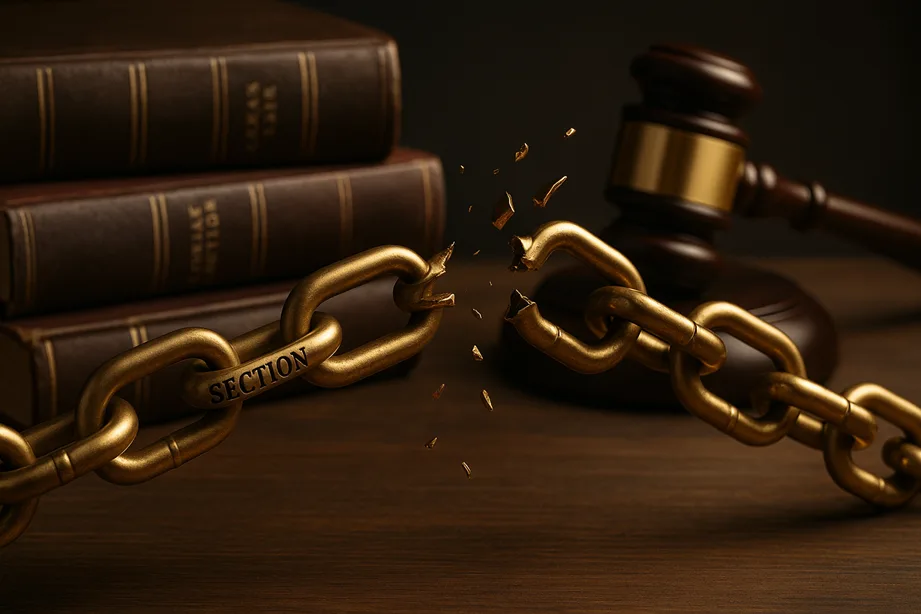
Conclusion
While Section 497 is no longer a crime, it retains relevance in divorce and civil disputes. The legal system prioritizes privacy and equality, shifting focus from punitive measures to resolving marital issues through civil channels. Individuals should seek tailored legal advice to navigate these complexities effectively.